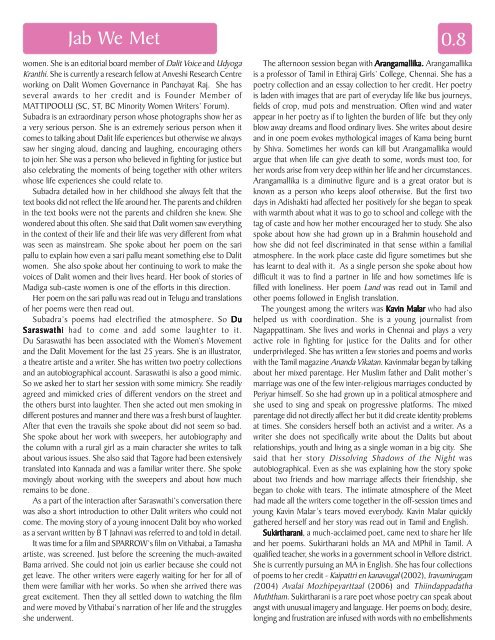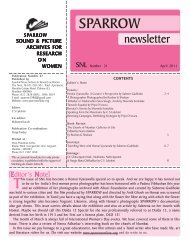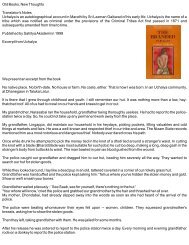SNL25-26_final for print.pmd - sparrow
SNL25-26_final for print.pmd - sparrow
SNL25-26_final for print.pmd - sparrow
- No tags were found...
Create successful ePaper yourself
Turn your PDF publications into a flip-book with our unique Google optimized e-Paper software.
Jab We Metwomen. She is an editorial board member of Dalit Voice and UdyogaKranthi. She is currently a research fellow at Anveshi Research Centreworking on Dalit Women Governance in Panchayat Raj. She hasseveral awards to her credit and is Founder Member ofMATTIPOOLU (SC, ST, BC Minority Women Writers’ Forum).Subadra is an extraordinary person whose photographs show her asa very serious person. She is an extremely serious person when itcomes to talking about Dalit life experiences but otherwise we alwayssaw her singingProfileoaloud, dancing and laughing, encouraging othersto join her. She was a person who believed in fighting <strong>for</strong> justice butalso celebrating the moments of being together with other writerswhose life experiences she could relate to.Subadra detailed how in her childhood she always felt that thetext books did not reflect the life around her. The parents and childrenin the text books were not the parents and children she knew. Shewondered about this often. She said that Dalit women saw everythingin the context of their life and their life was very different from whatwas seen as mainstream. She spoke about her poem on the saripallu to explain how even a sari pallu meant something else to Dalitwomen. She also spoke about her continuing to work to make thevoices of Dalit women and their lives heard. Her book of stories ofMadiga sub-caste women is one of the ef<strong>for</strong>ts in this direction.Her poem on the sari pallu was read out in Telugu and translationsof her poems were then read out.Subadra’s poems had electrified the atmosphere. So DuSaraswathi had to come and add some laughter to it.Du Saraswathi has been associated with the Women’s Movementand the Dalit Movement <strong>for</strong> the last 25 years. She is an illustrator,a theatre artiste and a writer. She has written two poetry collectionsand an autobiographical account. Saraswathi is also a good mimic.So we asked her to start her session with some mimicry. She readilyagreed and mimicked cries of different vendors on the street andthe others burst into laughter. Then she acted out men smoking indifferent postures and manner and there was a fresh burst of laughter.After that even the travails she spoke about did not seem so bad.She spoke about her work with sweepers, her autobiography andthe column with a rural girl as a main character she writes to talkabout various issues. She also said that Tagore had been extensivelytranslated into Kannada and was a familiar writer there. She spokemovingly about working with the sweepers and about how muchremains to be done.As a part of the interaction after Saraswathi’s conversation therewas also a short introduction to other Dalit writers who could notcome. The moving story of a young innocent Dalit boy who workedas a servant written by B T Jahnavi was referred to and told in detail.It was time <strong>for</strong> a film and SPARROW’s film on Vithabai, a Tamashaartiste, was screened. Just be<strong>for</strong>e the screening the much-awaitedBama arrived. She could not join us earlier because she could notget leave. The other writers were eagerly waiting <strong>for</strong> her <strong>for</strong> all ofthem were familiar with her works. So when she arrived there wasgreat excitement. Then they all settled down to watching the filmand were moved by Vithabai’s narration of her life and the strugglesshe underwent.0.8The afternoon session began with Arangamallika. Arangamallikais a professor of Tamil in Ethiraj Girls’ College, Chennai. She has apoetry collection and an essay collection to her credit. Her poetryis laden with images that are part of everyday life like bus journeys,fields of crop, mud pots and menstruation. Often wind and waterappear in her poetry as if to lighten the burden of life but they onlyblow away dreams and flood ordinary lives. She writes about desireand in one poem evokes mythological images of Kama being burntby Shiva. Sometimes her words can kill but Arangamallika wouldargue that when life can give death to some, words must too, <strong>for</strong>her words arise from very deep within her life and her circumstances.Arangamallika is a diminutive figure and is a great orator but isknown as a person who keeps aloof otherwise. But the first twodays in Adishakti had affected her positively <strong>for</strong> she began to speakwith warmth about what it was to go to school and college with thetag of caste and how her mother encouraged her to study. She alsospoke about how she had grown up in a Brahmin household andhow she did not feel discriminated in that sense within a familialatmosphere. In the work place caste did figure sometimes but shehas learnt to deal with it. As a single person she spoke about howdifficult it was to find a partner in life and how sometimes life isfilled with loneliness. Her poem Land was read out in Tamil andother poems followed in English translation.The youngest among the writers was Kavin Malar who had alsohelped us with coordination. She is a young journalist fromNagappattinam. She lives and works in Chennai and plays a veryactive role in fighting <strong>for</strong> justice <strong>for</strong> the Dalits and <strong>for</strong> otherunderprivileged. She has written a few stories and poems and workswith the Tamil magazine Ananda Vikatan. Kavinmalar began by talkingabout her mixed parentage. Her Muslim father and Dalit mother’smarriage was one of the few inter-religious marriages conducted byPeriyar himself. So she had grown up in a political atmosphere andshe used to sing and speak on progressive plat<strong>for</strong>ms. The mixedparentage did not directly affect her but it did create identity problemsat times. She considers herself both an activist and a writer. As awriter she does not specifically write about the Dalits but aboutrelationships, youth and living as a single woman in a big city. Shesaid that her story Dissolving Shadows of the Night wasautobiographical. Even as she was explaining how the story spokeabout two friends and how marriage affects their friendship, shebegan to choke with tears. The intimate atmosphere of the Meethad made all the writers come together in the off-session times andyoung Kavin Malar’s tears moved everybody. Kavin Malar quicklygathered herself and her story was read out in Tamil and English.Sukirtharani, a much-acclaimed poet, came next to share her lifeand her poems. Sukirtharani holds an MA and MPhil in Tamil. Aqualified teacher, she works in a government school in Vellore district.She is currently pursuing an MA in English. She has four collectionsof poems to her credit - Kaipattri en kanavugal (2002), Iravumirugam(2004) Avalai Mozhipeyarttaal (2006) and ThiindappadathaMuththam. Sukirtharani is a rare poet whose poetry can speak aboutangst with unusual imagery and language. Her poems on body, desire,longing and frustration are infused with words with no embellishments




